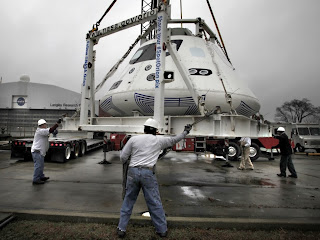A
test version of NASA's Orion spacecraft has been on a cross-country
road trip for the past week, and it's taking a week-long rest stop in
Tucson, Ariz, the space agency announced on Thursday.
Called “the boilerplate test article,” it is a structural mockup of the spacecraft NASA is building to take humans farther than they've ever been before that will be used in tests off the coast of San Diego in February. It left NASA's Langley Research Center in Virginia on Dec. 11 and has been making its way to California via truck since then. But the trip will pause for the holidays starting Thursday, and the test article will spend two weeks at the Pima Air & Space Museum in Tucson. The Orion test article is set to arrive at the museum between 3 p.m. and 5 p.m. MST.
Once it arrives Thursday, the test article will be available to be seen by the public for free for two hours outside of the museum. Afterward, it will be moved into a hanger inside the museum, where the public can see it with a museum ticket.
The test article will leave Tucson on Jan. 2 and arrive at the U.S. Navy's Naval Base San Diego by Jan. 7.
The
18,000-pound mockup is a full-sized replica of the Orion spacecraft
currently being built at NASA's Kennedy Space Center. The mockup has
already been used in a number of tests to ensure that Orion will be
ready for its first mission, Exploration Flight Test-1, scheduled for
September 2014. That mission will take Orion to 3,600 miles above the
Earth's surface before returning it at speeds of up to 20,000 miles
per hour for a splash landing in the Pacific Ocean.
In February, it will be used for an underway recovery test in the Pacific Ocean. For this test, the mockup will be set adrift in open and unstable waters, providing NASA and U.S. Navy the opportunity to recover the capsule and bring it into the well deck of the USS San Diego. While deployed, the team will seek out various sea states in which to practice the capsule recovery procedures. This will help build a knowledge base of how the capsule recovery differs in calm and rough seas and what the true physical limits are.
NASA and the Navy previously used this mockup to practice recovery in calm seas during a stationary recovery test in August where the spacecraft was set adrift in the waters of Naval Station Norfolk in Virginia and recovered into the docked well deck of the USS Arlington. The mockup was also dropped from 25 feet above the water of Langley's Hydro Impact Basin to simulate different splashdown scenarios.
In February, it will be used for an underway recovery test in the Pacific Ocean. For this test, the mockup will be set adrift in open and unstable waters, providing NASA and U.S. Navy the opportunity to recover the capsule and bring it into the well deck of the USS San Diego. While deployed, the team will seek out various sea states in which to practice the capsule recovery procedures. This will help build a knowledge base of how the capsule recovery differs in calm and rough seas and what the true physical limits are.
NASA and the Navy previously used this mockup to practice recovery in calm seas during a stationary recovery test in August where the spacecraft was set adrift in the waters of Naval Station Norfolk in Virginia and recovered into the docked well deck of the USS Arlington. The mockup was also dropped from 25 feet above the water of Langley's Hydro Impact Basin to simulate different splashdown scenarios.
Receive
DCNewsroom email alerts, subscribe here.


No comments:
Post a Comment